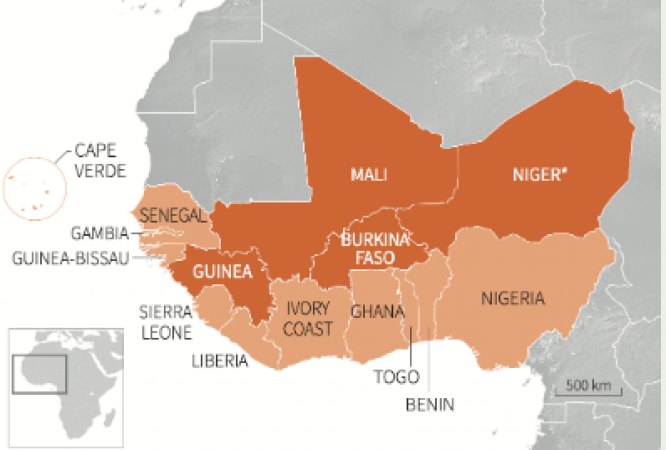
West Africa and the Sahel region, characterized by diverse cultures, languages, and histories, have faced a distressing surge in coups and political turmoil in recent years. The alarming frequency of successful coups in 2022 alone - witnessed in countries such as Mali, Guinea, Burkina Faso, and Sudan - has raised concerns about the region's democratic future. Delving into the multifaceted factors that underpin this wave of instability is crucial to understanding the complex challenges West Africa and the Sahel confront.
Weak Political Institutions: A Breeding Ground for Instability
One central factor contributing to the resurgence of coups is the presence of weak political institutions in many countries within the region. These institutions struggle to effectively manage conflicts, provide essential services to citizens, and promote democratic values. In this environment of fragility, military officers promising transformative change are often able to exploit discontent and disaffection among the population, leading to the overthrow of governments.
Economic Hardship and Discontent
Economic challenges have plagued West Africa and the Sahel, fostering discontent among citizens and creating an environment ripe for exploitation by coup plotters. Skyrocketing unemployment, pervasive poverty, and food insecurity have left a significant portion of the population disillusioned with the promises of democratic governance. This disillusionment becomes fertile ground for those seeking to challenge established political orders.
Security Threats as Catalysts
The region's vulnerability to security threats, including terrorism, organized crime, and intercommunal violence, has created an environment conducive to political instability. The rise of extremist groups like Boko Haram and al-Qaeda in the Islamic Maghreb (AQIM) has deepened the climate of insecurity, enabling coup plotters to leverage the situation for their advantage. The volatile security landscape diminishes public trust in democratic institutions and can facilitate the success of coup attempts.
Foreign Interference Amplifies Instability
Foreign interference has also played a pivotal role in the resurgence of coups in West Africa and the Sahel. Some nations in the region have been accused of supporting coups in neighboring countries, often driven by their own interests to maintain influence or thwart the rise of unfavorable governments. This interference can further exacerbate internal conflicts and impede democratic progress.
A Historical Legacy: The Impact of Colonialism
The legacy of colonialism casts a long shadow over West Africa and the Sahel. The history of European colonization has left a profound imprint on the political landscape of the region, with countries grappling to establish strong democratic institutions after enduring years of authoritarian rule. The challenge of overcoming this historical legacy is compounded by the need to consolidate democratic principles and strengthen governance structures.
The Threat of Extremism
Extremist groups like Boko Haram and AQIM have exploited the political instability and economic struggles within the region. They have taken advantage of the environment to recruit new members and execute attacks, undermining the foundations of stability. The presence of these groups intensifies citizens' feelings of insecurity and sows discord among diverse communities.
Also Read: "Russian Military Parade at Patriot Park: Showcasing Seized Western Gear Amid Rising Tensions
The Shifting Global Order
The evolving global order has also contributed to instability in West Africa and the Sahel. The withdrawal of Western powers, including the United States, from the region has created a power vacuum that can be manipulated by those seeking to subvert established governments. The absence of external security forces leaves countries more vulnerable to coup attempts and violent upheavals.
The Path Forward: Addressing Root Causes
Preventing the cycle of coups and instability requires a concerted effort to address the root causes. Strengthening political institutions is paramount to establishing a solid foundation for democratic governance. Governments in the region, with support from international organizations, need to prioritize conflict resolution mechanisms, efficient service delivery, and transparent governance.
Economic Empowerment for Social Stability
Economic empowerment and poverty alleviation programs are crucial components of addressing the instability dilemma. By addressing high unemployment rates, food insecurity, and poverty, governments can mitigate public discontent and reduce the appeal of coup plotters who exploit economic grievances.
Security and Stability: A Joint Effort
Combating security threats is pivotal to curbing the cycle of coups. A coordinated regional approach to counterterrorism, promoting community cohesion, and enhancing security sector reform is essential to reestablishing stability. Fostering cooperation among nations can lead to the sharing of intelligence, strategies, and resources to combat extremism and restore peace.
Reducing Foreign Interference
To counter the disruptive influence of foreign actors, West African and Sahel nations must strengthen regional diplomacy and collaboration. By working collectively to uphold democratic values and resist interference, countries can reclaim agency over their political destinies.
Promoting Democracy through International Support
The international community has a pivotal role to play in bolstering democracy in West Africa and the Sahel. Financial assistance, technical support, and capacity-building initiatives can help strengthen political institutions, enhance governance, and promote inclusive participation. Collaborative efforts can contribute to creating an environment conducive to sustainable democratic development.
Also Read: Food Crisis Sparks Armenia-Azerbaijan Conflict at UN Over Nagorno-Karabakh
The resurgence of coups and political instability in West Africa and the Sahel is a complex challenge requiring a multifaceted response. Addressing weak political institutions, economic hardships, security threats, historical legacies, and the shifting global order is paramount. By committing to strong governance, economic empowerment, security cooperation, reduced foreign interference, and international support, the region can embark on a path of stability and democracy. Only through sustained efforts and a united front can West Africa and the Sahel overcome these challenges and pave the way for a more prosperous and democratic future.